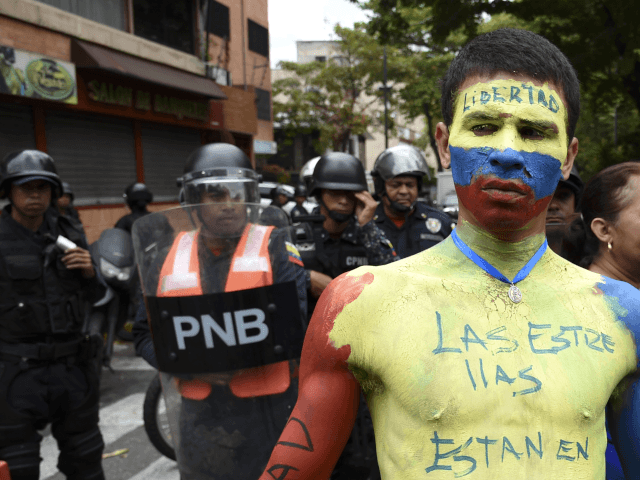The Chinese state newspaper Global Times claimed in a column Tuesday that American sanctions on the wealthy senior members of Nicolás Maduro’s illegitimate socialist regime were to blame for the ongoing humanitarian crisis in that country, contrasting U.S. sanctions with Chinese aid to Maduro.
The Times accused the U.S. sanctions – placed largely on Maduro, his family, and the assortment of jihadi affiliates and drug traffickers that manage his regime – of helping bring Venezuela to its “darkest hour,” failing to mention the multiple attempts by the Trump administration to send humanitarian aid to Venezuela and Maduro’s consistent denial of severe food and medicine shortages in the country.
China is heavily invested in Maduro’s regime, making billions selling it technology to aid in its totalitarian control of society. The Chinese Communist Party has not explicitly stated that it views Maduro as the president of the country since his term expired in January, however, when socialist interim President Juan Guaidó took over.
The United States, like most of the Western Hemisphere, accepts Guaidó as the only legitimate head of state in Venezuela.
“The Guardian reported that the Venezuela crisis was taking a ‘deadly toll on buckling health system.’ One of the reasons for the crisis is US harsh sanctions against the country,” the Global Times argued Tuesday. “External intervention and sanctions can hardly resolve anything. They will only complicate the situation. The attempt to change the government in Venezuela through sanctions is a grave violation of basic UN Charter principles. This hegemonic practice by Washington is a major cause of turmoil in many parts of the world.”
“If the US wishes to restore its influence in Latin America, it must first of all show respect for others’ sovereignty, instead of rude interference,” the column continued. “It’s time for Washington to consider lifting the sanctions as soon as possible. Otherwise, the reputation of the US will be further jeopardized.”
Rather than compare America’s acceptance of Guaidó as the constitutional president of Venezuela to China’s violations of the sovereignty of Taiwan, the Philippines, Vietnam, India, Sri Lanka, Japan, Argentina, Kenya, and elsewhere, the article attempted to elevate China’s international standing by announcing Beijing had sent humanitarian aid to Maduro.
“Amid severe shortages of medicines and medical supplies, a Chinese cargo plane with 68 tons of relief materials and medical aid arrived Monday in Caracas, Venezuela, according to Xinhua. They will be delivered to medical centers in the country,” the Global Times reported. China, it claimed, was “helping Venezuelan people surmount the negative effects of external interference and sanctions with no political conditions attached.”
“While the US is unilaterally imposing sanctions against Venezuela, Beijing has been providing the country with humanitarian assistance, adhering to its consistent position against hegemonism in international affairs,” it continued.
Venezuela has been suffering extensive food and medicine shortages since 2014, the year after Maduro took over for late dictator Hugo Chávez. Maduro has weaponized foreign aid, placing the nation’s food supply in the hands of his trusted military commanders in 2016, who then began selling it to starved Venezuelans at over 100 times the market value. The military did keep some of the food to distribute for free as part of the CLAP (Local Committees for Supply and Production) system, but reports for years have revealed only trusted Maduro allies have access to CLAP packages.
When the United States attempted to send humanitarian aid to Venezuela this year, jeopardizing Maduro’s monopoly on the food supply, Maduro deployed the military to the Colombian border to block the shipments. One of his top government officials, Delcy Rodríguez, went on state television and told Venezuelans that U.S. food packages were “carcinogenic” and contained “biological weapons.”
By sending Maduro humanitarian aid shipments, China seeks to help him maintain control of the military even as the majority of Venezuelans reject his rule by giving him something to bargain with.
China has invested in Venezuela’s socialist dictatorship for years. While Beijing avoided the country in 2017, when it appeared Maduro would finally fall, Maduro got Communist Party leader Xi Jinping to agree to a $5 billion credit line last September in exchange for millions of barrels of crude oil.
China’s government-controlled corporations have made billions in corrupt Venezuelan infrastructure projects and are set to make more in the future. Maduro announced next week an “immediate” investment in Huawei, the embattled communist-run telecommunications giant American officials are warning presents a threat to international security. Through companies like Huawei and ZTE, Maduro has been able to implement an all-encompassing technical security apparatus to monitor opposition members and political dissidents.
The Chinese regime is “single-handedly helping conduct the Internet control operation” in Venezuela, Senator Marco Rubio (R-FL) told Breitbart News in early May. “They have basically taken a commercial version of their great Internet firewall and given it to Maduro, and it is a service they are providing him, so they are the ones that are shutting down the Internet and access to social media.”
To protect its investments, China sent a delegation to Caracas in mid-May and one to Cuba, which controls the Maduro regime, this week. The Chinese envoy agreed with Cuban Foreign Minister Bruno Rodríguez that “the Venezuela issue can only be solved through peaceful, independent consultation and dialogue between the government and the opposition,” Chinese Foreign Ministry spokesman Lu Kang told reporters Wednesday. “China and Cuba will strengthen communication with countries in the region and the international community to continue to play a constructive role in the settlement of this issue.”

COMMENTS
Please let us know if you're having issues with commenting.